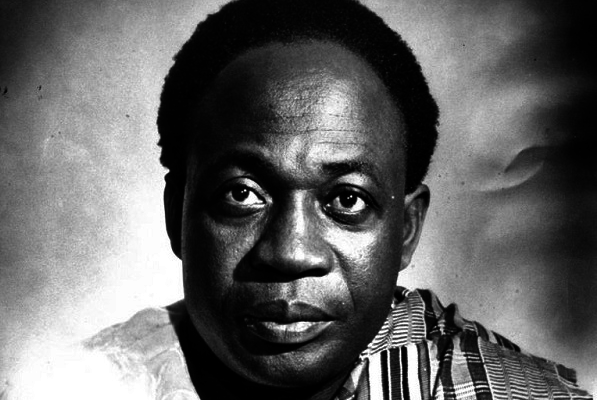Kwame Nkrumah was born on 21 September 1909 in Nkroful, Gold Coast (now in Ghana to a poor and illiterate family. Nkroful was a small village in the Nzema area, in the far southwest of the Gold Coast, close to the frontier with the French colony of the Ivory Coast. His father did not live with the family, but worked in Half Assini where he pursued his goldsmith business until his death. Kwame Nkrumah was raised by his mother and his extended family, who lived together in traditional fashion, with more distant relatives often visiting. He lived a carefree childhood, spent in the village, in the bush, and on the nearby sea.
By the naming customs of the Akan people, he was given the name Kwame, the name given to males born on a Saturday. During his years as a student in the United States, though, he was known as Francis Nwia Kofi Nkrumah, Kofi being the name given to males born on Friday. He later changed his name to Kwame Nkrumah in 1945 in the UK, preferring the name “Kwame”.
According to Ebenezer Obiri Addo in his study of the future president, the name “Nkrumah”, a name traditionally given to a ninth child, indicates that Kwame likely held that place in the house of his father, who had several wives.
United States
According to historian John Henrik Clarke in his article on Nkrumah’s American sojourn, “the influence of the ten years that he spent in the United States would have a lingering effect on the rest of his life.” Nkrumah had sought entry to Lincoln University some time before he began his studies there. On 1 March 1935, he sent the school a letter noting that his application had been pending for more than a year. When he arrived in New York in October 1935, he traveled to Pennsylvania, where he enrolled despite lacking the funds for the full semester.
He soon won a scholarship that provided for his tuition at Lincoln. He remained short of funds through his time in the US. To make ends meet, he worked in menial jobs, including as a dishwasher. On Sundays, he visited black Presbyterian churches in Philadelphia and in New York.
Nkrumah completed a Bachelor of Arts degree in economics and sociology in 1939. Lincoln then appointed him an assistant lecturer in philosophy, and he began to receive invitations to be a guest preacher in Presbyterian churches in Philadelphia and New York.
In 1939, Nkrumah enrolled at Lincoln’s seminary and at the Ivy League University of Pennsylvania in Philadelphia and in 1942, he was initiated into the Mu chapter of Phi Beta Sigma fraternity at Lincoln University.
Nkrumah gained a Bachelor of Theology degree from Lincoln in 1942, the top student in the course. He earned from Penn the following year a Master of Arts degree in philosophy and a Master of Science in education. While at Penn, Nkrumah worked with the linguist William Everett Welmers, providing the spoken material that formed the basis of the first descriptive grammar of his native Fante dialect of the Akan language.
Nkrumah spent his summers in Harlem, a center of black life, thought and culture. He found housing and employment in New York City with difficulty and involved himself in the community. He spent many evenings listening to and arguing with street orators, and according to Clarke, Kwame Nkrumah in his years in America stated:
These evenings were a vital part of Kwame Nkrumah’s American education. He was going to a university – the university of the Harlem Streets. This was no ordinary time and these street speakers were no ordinary men …The streets of Harlem were open forums, presided over [by] master speakers like Arthur Reed and his protege Ira Kemp. The young Carlos Cook, founder of the Garvey oriented African Pioneer Movement was on the scene, also bringing a nightly message to his street followers. Occasionally Suji Abdul Hamid, a champion of Harlem labour, held a night rally and demanded more jobs for blacks in their own community …This is part of the drama on the Harlem streets as the student Kwame Nkrumah walked and watched.
London
Nkrumah returned to London in May 1945 and enrolled at the London School of Economics as a PhD candidate in anthropology. He withdrew after one term and the next year enrolled at University College, with the intent to write a philosophy dissertation on “Knowledge and Logical Positivism”. His supervisor, A. J. Ayer, declined to rate Nkrumah as a “first-class philosopher”, saying, “I liked him and enjoyed talking to him but he did not seem to me to have an analytical mind. He wanted answers too quickly. I think part of the trouble may have been that he wasn’t concentrating very hard on his thesis. It was a way of marking time until the opportunity came for him to return to Ghana.”Finally, Nkrumah enrolled in, but did not complete, a study in law at Gray’s Inn.
Nkrumah spent his time on political organizing. He and Padmore were among the principal organizers, and co-treasurers, of the Fifth Pan-African Congress in Manchester (15–19 October 1945). The Congress elaborated a strategy for supplanting colonialism with African socialism. They agreed to pursue a federal United States of Africa, with interlocking regional organizations, governing through separate states of limited sovereignty. They planned to pursue a new African culture without tribalism, democratic within a socialist or communist system, synthesizing traditional aspects with modern thinking, and for this to be achieved by nonviolent means if possible. Among those who attended the congress was the venerable W. E. B. Dubois along with some who later took leading roles in leading their nations to independence, including Hastings Banda of Nyasaland (which became Malawi), Jomo Kenyatta of Kenya and Obafemi Awolowo of Nigeria.
The congress sought to establish ongoing African activism in Britain in conjunction with the West African National Secretariat (WANS) to work towards the decolonization of Africa. Nkrumah became the secretary of WANS. In addition to seeking to organize Africans to gain their nations’ freedom, Nkrumah sought to succour the many West African seamen who had been stranded, destitute, in London at the end of the war, and established a Colored Workers Association to empower and succour them. The U.S. State Department and MI5 watched Nkrumah and the WANS, focusing on their links with Communism.
Nkrumah and Padmore established a group called The Circle to lead the way to West African independence and unity; the group aimed to create a Union of African Socialist Republics. A document from The Circle, setting forth that goal, was found on Nkrumah upon his arrest in Accra in 1948, and was used against him by the British authorities.



